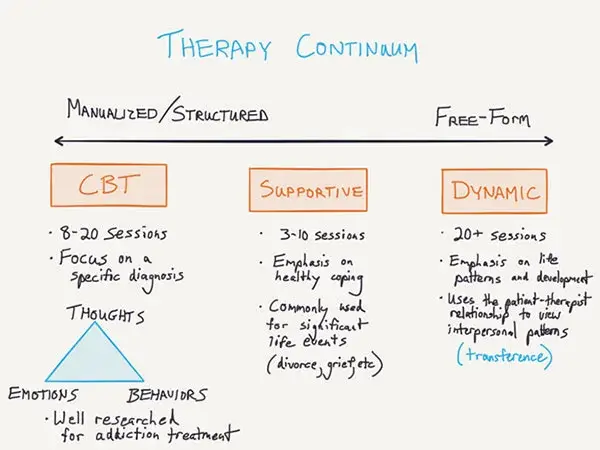PSYCHOTHERAPY
CBT and Dynamic Therapy (also called talk therapy or counseling) come in many forms. These work both as an individual approach or as a group. For our purposes, we’ll stick to individual psychotherapy, as this is much more accessible to people. This is different than peer support programs, such as Alcoholics or Narcotics Anonymous. An important distinction is that psychotherapy involves a licensed clinician. There is payment for services, and a therapeutic agenda focusing on you and your health. There isn’t a mutual helping option. Remember this concept when we go deeper into this article.
Cognitive Behavioral Therapy
Think of psychotherapy as on a continuum. One side of the continuum involves more structured, guided forms of therapy. Cognitive Behavioral Therapy (CBT) is the most common version. CBT has been around since the late 1970’s. It involves learning about your thought patterns linked to emotions and behaviors. The thoughts-emotions-triangle (see diagram) is a core method in CBT. Your therapist will help you to identify ‘automatic thoughts.’ These are ‘knee-jerk’ thoughts you tend to have in situations. Sometimes those automatic thoughts are distorted and not accurate. You may need to recognize a pattern and work to change it.
CBT also involves the concept of a ‘schema’ or set of ‘core beliefs’ that you may have about yourself and the world. Crafted over many years, this schema can be difficult to adjust. All people can struggle with the problem of confirmation bias. Confirmation bias is an emotional attachment to your schema and belief that it is true. You will only pay attention to the information that supports the schema and would reject any contrary information. A classic example of this is in the addiction cycle where you convince yourself you’re actually in control. Even though most of your days are spent buying drugs and using them. You’ll choose to remember a day in which you used less intensely or were able to abstain from using. You may tell yourself “See…I can quit whenever I want!”
Helpful for Recovery
There is good clinical research showing that CBT is helpful for addiction recovery. It lends itself well to this form of treatment because it has structure, homework components, and teaches new skills. It also is a good treatment for helping people heal from Major Depression or Anxiety Disorders.
Dynamic Therapy
On the other side of the therapy continuum is Dynamic Psychotherapy. Considered insight-oriented therapy with less structure, the therapist would work with you to understand your background and see how your past relationships get played out today. This is a good therapy for people who find themselves in repetitive cycles with other people. An example would be a person who always tends to date emotionally unavailable people, as he is recreating the way life was with an unavailable mother.
Dynamic therapy may also involve understanding your defense mechanisms to cope with things and better understand the emotional conflicts you carry inside. A great quote from the television show Mad Men illustrates this issue: “Most people’s problem is the battle between what they want and what’s expected of them.” Understanding your conflicts makes you more aware so that you can live free and choose what you want!
Other Therapy Options
There are also different therapy options in-between CBT and Dynamic Psychotherapy, like Supportive Therapy. It is brief (maybe 3-10 sessions), focuses on good coping skills, and helps people talk through a change happening in life. An example of significant change would be going through a divorce or a receiving a new medical diagnosis.
This schematic just lays out the basic forms of therapy. There are numerous other modalities that draw from some of the above core therapies. Examples would include some of the specific trauma therapies, Dialectical Behavioral Therapy (DBT) which is a form of CBT, and relational therapies including couple’s therapy.
If you feel you could use an individual therapist, you definitely want a therapist who gives you the best treatment to match your condition. It’s good to have a basic idea of the styles of talk therapy so that you can find someone to meet your needs. Many therapists will advertise if they provide more of a CBT form of therapy or a Dynamic Psychotherapy approach.
Read more CeDAR Education Articles about Psychotherapy including Locus of Control.

